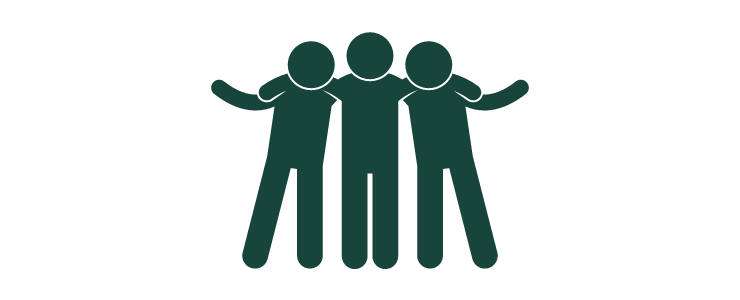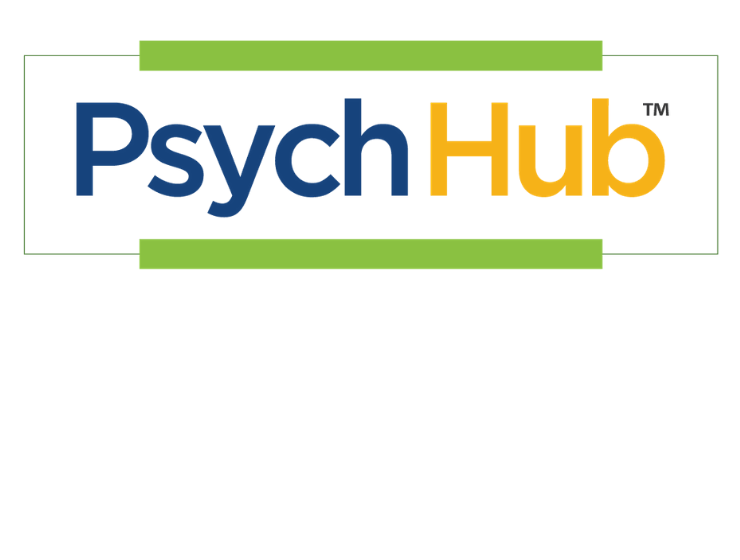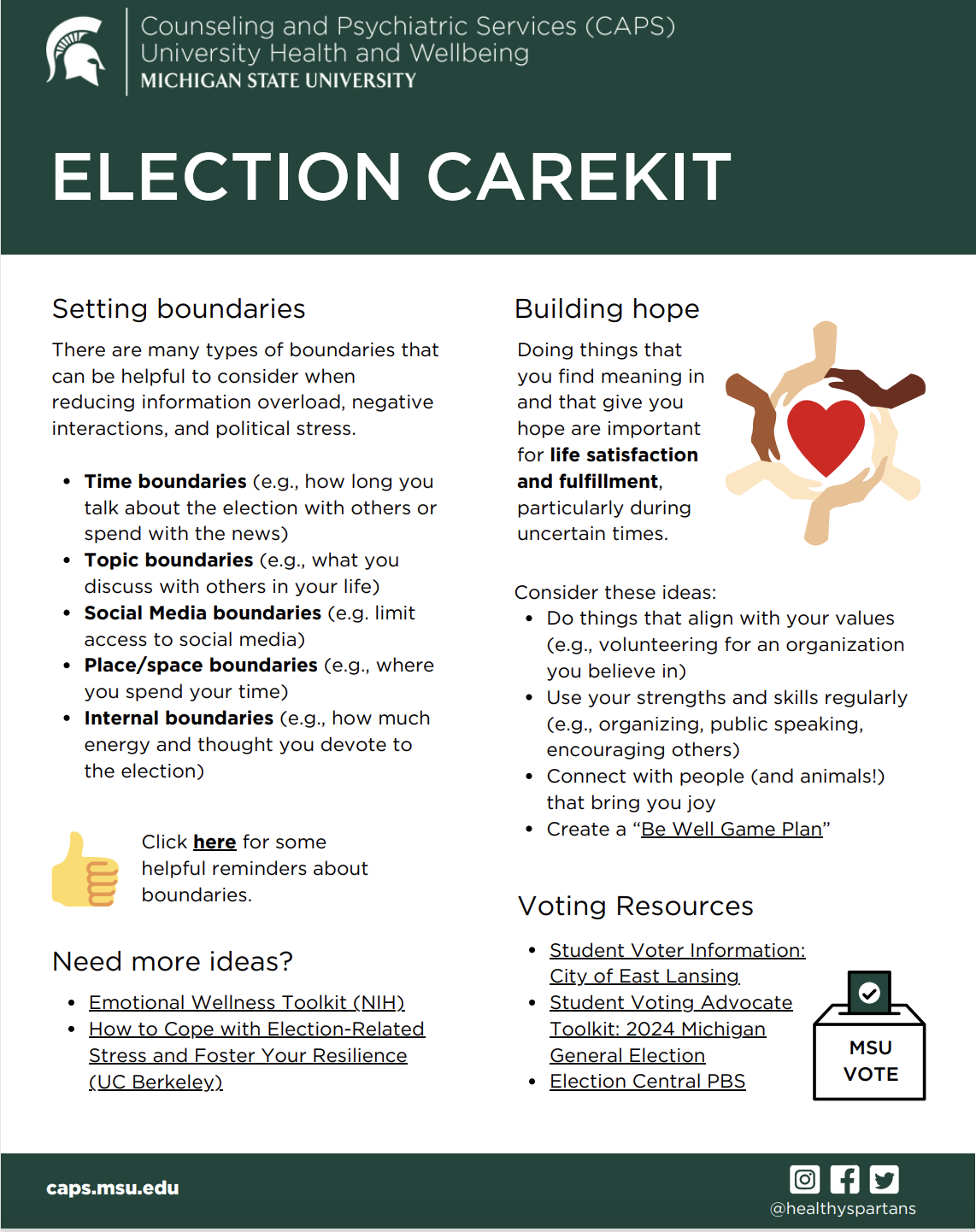Resources
There are many mental health resources available to students, their families, faculty and staff. Below, we’ve curated resources for self-help, assignment-related questions and more.
Mental Health phone support for Michiganders living with persistent mental health conditions during the COVID-19 situation is available through MDHHS. The peer-run phone support is available seven days a week 10 a.m. to 2 a.m. at (888) 733-7753.
If you are in crisis, please call 911 or go to the nearest emergency room. CAPS crisis services are also available 24/7. Call (517) 355-8270 and press “1” at the prompt to speak with a crisis counselor.
To access new counseling and psychiatric services, schedule a consultation. During your consultation, we'll discuss your needs and help you get connected with available resources on or off-campus based on clinical recommendations.
SAMHSA’s National Helpline: also known as the Treatment Referral Routing Service, this Helpline provides 24-hour free and confidential treatment referral and information about mental and/or substance use disorders, prevention, and recovery in English and Spanish. Call 1.800.662.HELP (4357).
211 is a nationwide service connecting millions of people to help every year. Visit mi211.org or call 211 (multiple languages offered) to get connected to assistance with emergencies and disasters, food, health services, housing and utilities, human trafficking, jobs and employment, reentry following incarceration, and veteran needs.
Accessing Mental Health Services
Learn more about how students can access mental health services, the availability of CAPS services and more.
Virtual Care Kit
Self-care tips to reduce stress, keep a routine and find connection in a virtual world. You might also enjoy the Spartan Bucket List, full of activities and opportunites that can help you feel more connected to the MSU community.
Coping With COVID-19
Exploring the psychological toll COVID-19 has taken — and how to cope with it.
View Resources

Interviews & Class Assignments
Information for students requesting interviews or insights while completing assignments.
Learn More

Resources for Parents and Guardians
College is full of transitions — for you and your student. Here's what you should know about your student's mental health.
See Resources
Our partners at PsychHub have an online video library covering many common mental health topics, like mindfulness, information about mental illnesses and more.
Election Carekit
Free & Anonymous Self-Assessments
These free, anonymous online screening assessments can help determine whether professional consultation would be helpful toyou. These tools are available to all students at Michigan State University.
- Visit screening.mentalhealthscreening.org/hyho for a variety of screenings and more information about mental health.
- The ULifeline Self-Evaluator includes the option to indicate you're at MSU, but your responses remain anonymous.
- Mental Health Screening Tools from Mental Health America include several free and anonymous or confidential screenings including those for Depression, Anxiety, Bipolar, Alcohol or Substance Use Screening and Post-Traumatic Stress Disorder (PTSD).
- Additional screening tools for Depression, Anxiety and Eating Disorders are also available.
- Food Security Self-Assessment: Food insecurity refers to having limited food availability with a reduction in the quality or variety of food intake, which often results in disrupted eating patterns. A lack of food security can be a considerable obstacle to academic success.
Resources for Survivors of Relationship Violence, Stalking and Sexual Misconduct
- Know More: Poster providing resources available through MSU and the community about relationship violence, stalking and sexual misconduct. This poster also contains contact information to support and reporting resources.
- Groups and workshops are available through the MSU Center for Survivors.
Substance Use
CAPS staff are available to identify problems relating to students’ use of alcohol or other drugs. Individualized assessment, counseling, and referrals are available by calling (517) 355-8270. For further information, please refer to the MSU Health Promotion AOD Program or call (517) 884-6598. For students in recovery, please visit the MSU Collegiate Recovery Community.
If you are living with serious mental illness or substance use challenges and feel it will help lower your stress if you talk with someone who understands these issues, get help from:
Michigan Warmline: 1-888-PEER-753 (888-733-7753) Available every day from 10 a.m. to 2 a.m.
Feedback Forms
- Misconduct Hotline: If you have a concern about misconduct, don’t keep it to yourself. Discuss it with a supervisor or contact the Misconduct Hotline.
- Office for Civil Rights and Title IX Education and Compliance: MSU treats all reports filed with OIE seriously. Anyone is welcome to file a report with OIE, including students, faculty, staff, and guests.
External Resources
Follow the links below to learn more about mental health, how to recognize mental health struggles and more.
- Suicide prevention and awareness resources include the American Foundation for Suicide Prevention, National Suicide Prevention Lifeline, American Association of Suicidology and QPR Institute.
- JED Foundation: Equips teens and young adults with the skills and knowledge to help themselves and each other. The foundation encourages community awareness, understanding and action for young adult mental health.
- Mental Health America – Life on Campus: Explores common challenges for students transitioning from life at home to living on campus.
- National Alliance of Mental Illness (NAMI): The nation’s largest grassroots mental health organization dedicated to building better lives for the millions of Americans affected by mental illness. See their guide to managing a mental health condition in college.
- National Institute of Mental Illness: the lead federal agency for research on mental disorders.
- Society for Adolescent Health and Medicine – Mental Health Resources for Adolescents, Young Adults, and Parents: A compilation of resources for mental health, sexual health, substance use and more.
- Trevor Project: The leading national organization providing crisis intervention and suicide prevention services to lesbian, gay, bisexual, transgender, queer & questioning (LGBTQ) young people under 25.
- Learn Psychology – Mental Health and Well-Being for College Students: A comprehensive guide to help college students identify common mental health disorders, their warning signs, how to manage them and when to seek treatment.
- ULifeline: an anonymous, confidential, online resource center, where college students can be comfortable searching for the information they need and want regarding emotional health.
Campus and Community Resources for MSU Students
- Center for Gender in Global Context
- Couple and Family Therapy Clinic
- Employee Assistance Program (EAP)
- Health4U Program
- The Gender and Sexuality Campus Center
- MSU WorkLife Office
- Neighborhood Student Success Collaborative
- Inclusion and Intercultural Initiatives
- Office of Cultural & Academic Transitions (OCAT)
- Planned Parenthood (Lansing)
- Psychological Clinic
- Student Parent Resource Center
- Care and Intervention Team



